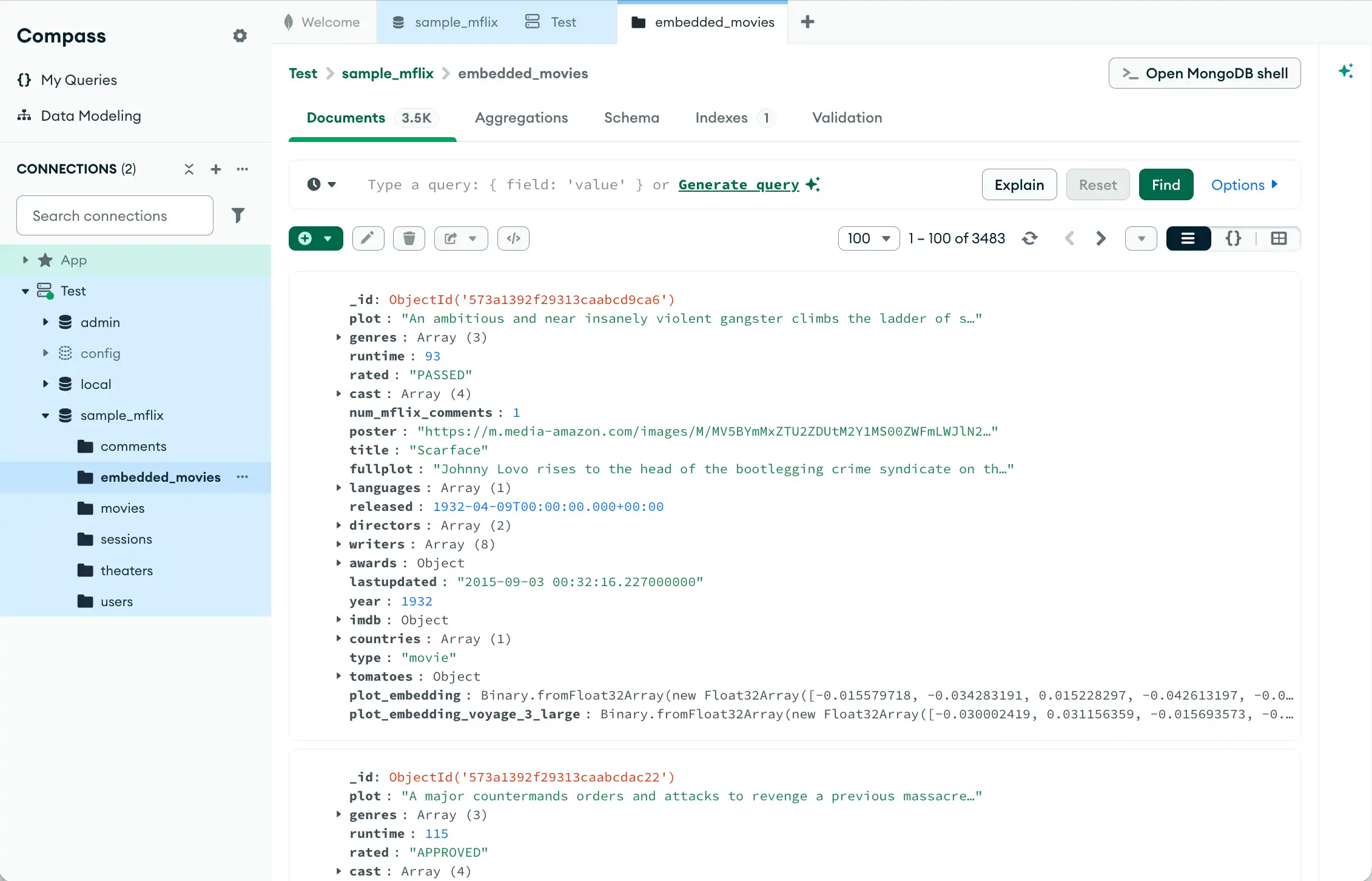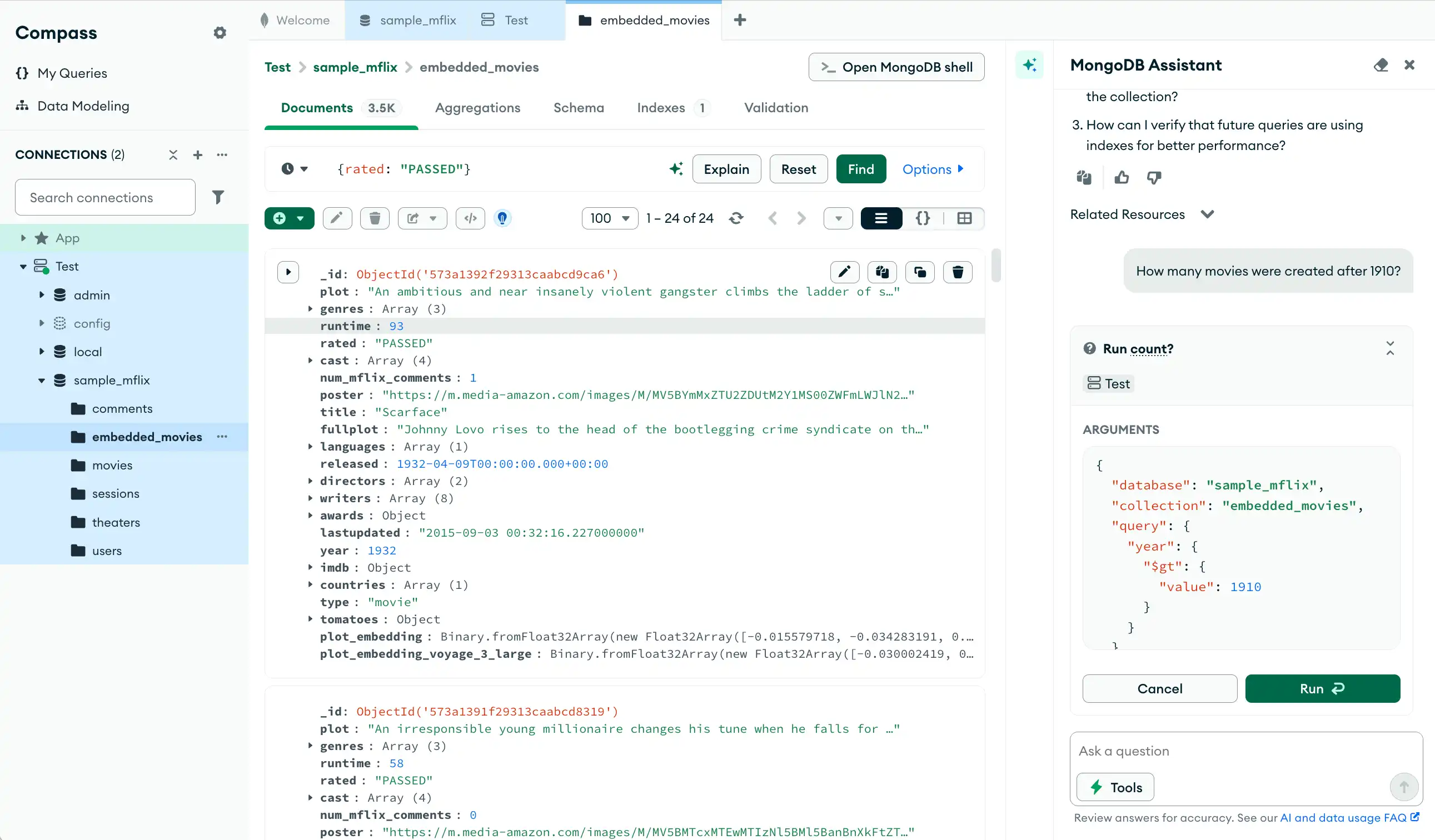インテリジェント 支援は、 MongoDB Compassの統合MongoDB開発サポート用に設計されたAIベースのツールです。自然言語の質問に答え、デバッグ エラーを支援し、パフォーマンス最適化のためのガイダンスを提供します。
AI 機能の有効化
MongoDB Compassでインテリジェントエージェントを使用するには、まず設定でAI機能を有効にします。
MongoDB CompassでAI機能を切り替える詳細については、自然言語クエリの有効化を参照してください。
インテリジェント エージェントへのアクセス
MongoDB Compassのインテリジェント 支援にアクセスするには、 のあるサイドバー パネルをクリックします。これにより、 支援が開き、 MongoDB Compass接続エラー、クエリ出力、説明プラン統計などに関連するさまざまな質問をすることができます。

図の 1。支援が折りたたまれたMongoDB Compassのホームページ。

図の 2。支援が展開されたMongoDB Compass のホームページ。
読み取り専用ツール
MongoDB Compass の支援者の読み取り専用ツールは、現在のタスクからコンテキストを取得したり、人間の承認を使用して接続されたMongoDBデプロイに対してデータベース操作を実行したりします。対話の応答とは異なり、これらのツールは実際のデータベースクエリを実行し、データベースからライブデータを返す場合があります 。
支援ツールには、次の重要な特徴があります。
読み取り専用: ツールはデータを変更、挿入、アップデート、または削除できません。
ユーザー認証: すべてのツールを実行するには明示的なユーザー確認が必要です。
コンテキスト: ツールを呼び出す際に、現在のデータベース、コレクション、および接続の を利用します。
ライブ データ: 接続されたMongoDBデプロイから結果がリアルタイムで送信されます。
Compass ツール
次のツールはユーザーの機密情報を取得し、確認を要求します。これらのツールはデータベースとはやり取りしませんが、使用する前にユーザーの確認が必要です。
Compass ツール名 | 説明 |
|---|---|
| クエリ バーからアクティブなMongoDBクエリ パラメータを抽出します |
| 集計ビルダからアクティブな集計パイプラインを抽出します |
Database Tools
データベースツール名 | 説明 |
|---|---|
| MongoDBデプロイで使用可能なすべてのデータベースと、そのストレージサイズを表示。 |
| 特定のデータベース内のすべてのコレクションを表示します。 |
| コレクションから特定の検索条件に一致する実際のドキュメントを検索します。 |
| ドキュメント自体を取得せずに、コレクション内のドキュメントの合計数をすばやく返します。 |
| グループ化、フィルタリング、変換、ドキュメント全体の統計情報の計算など、複雑なデータ処理操作を実行します。 |
| コレクションで定義されているすべてのインデックスを一覧表示します。 |
| コレクションを分析して、フィールド名やデータ型などのドキュメントの構造を明示します。 |
| データとインデックスの両方を含むコレクションが占有する物理ディスク領域を報告します。 |
| コレクション数、ドキュメント合計、ストレージ使用状況、インデックス統計など、データベースの健全性の包括的な概要を提供します。 |
| トラブルシューティング、パフォーマンス モニタリング、セキュリティ監査のために最近のサーバーログを取得します。 |
| 詳細なクエリ実行プランとパフォーマンス統計を表示し、 MongoDB がクエリをどのように処理するか、またインデックスを使用しているかどうかを示します。 |
注意
集計パイプラインステージ $out と $merge は書込み操作を実行するため、ツール呼び出しではサポートされていません。支援は読み取り専用ツールのみをサポートします。
サンプルフロー
例
次のシナリオでは、MongoDB Compassのインテリジェント支援の使用例を示しています。
接続エラー
接続エラー メッセージが表示された場合は、 MongoDB BIOS を使用してエラーをデバッグするように指示するポップアップが表示されます。 Debug をクリックすると、支援がエラーを診断するためのプロンプトを自動的に生成するように指示します。
Diagnose why my Compass connection is failing and help me debug it. Connection string (password redacted): mongodb+srv://user:****@cluster0.pndqllj.mongodb.net/ Error message: querySrv ECONNREFUSED
The error message querySrv ECONNREFUSED in MongoDB Compass typically points to a network issue when Compass is trying to discover your Atlas cluster using DNS SRV records in your connection string. Here are the most common causes and solutions for this issue: 1. Incorrect Hostname or Cluster Name - Ensure that the cluster hostname (cluster0.hrdfe.mongodb.net) in your connection string matches what is shown in your Atlas dashboard. - Typos or a deleted/renamed cluster will cause connection refusal. 2. Network Restrictions or Firewall Blocking - Atlas clusters operate on port 27017. Compass must be able to reach that port through your network. - Firewalls, VPNs, or proxies might block outbound connections to MongoDB Atlas. - Try connecting from a different network/location to rule out local filtering. - You can test if your network allows access to this port using http://portquiz.net:27017/. 3. DNS Issues - Compass uses DNS to resolve the SRV record in the connect string. If your DNS settings are incorrect or your network blocks DNS SRV lookups, connection will fail. Try restarting your computer or flushing your DNS cache. 4. Cluster Status - Verify that your MongoDB Atlas cluster is running and not paused or shut down. 5. Compass Version - Make sure you’re using an up-to-date version of MongoDB Compass. Atlas typically requires recent client versions. Recommended Steps to Debug: - Double-check your Atlas cluster name and hostname. - Ensure your local firewall allows outbound connections to “*.mongodb.net” over port 27017. - Check that the Atlas cluster is running (not paused). - Make sure your connection string is correct. - Use another network or device to see if the issue persists. If you’re still having trouble after these checks, please provide more details about your environment (e.g., Compass version, operating system, network setup), and I’ll be happy to help you further! For further reading, I recommend checking the Compass troubleshooting documentation, which covers these scenarios in detail before making any major changes to your environment.
説明プラン
インテリジェント エージェントに、MongoDB Compassクエリの出力を分析するようリクエストします。
Interpret this explain plan for me.
## Summary - **Query Logic:** This pipeline counts the number of Italian restaurants in Manhattan by first filtering documents and then aggregating the count. - **Performance:** Fair - **Recommendations:** Create a compound index on `{ borough: 1, cuisine: 1 }` to optimize document retrieval. ## Details ### Query Logic 1. `$match`: Filters documents where `borough` is "Manhattan" and `cuisine` is "Italian". 2. `$count`: Counts the number of documents matching the filter and outputs the total. ### Performance Analysis - The winning plan uses an index scan on the `cuisine` field (`cuisine_1`) and applies an in-memory filter for `borough` ("Manhattan"). - Both `totalKeysExamined` and `totalDocsExamined` are high (43,207), which implies that every document with `cuisine: "Italian"` is examined and then filtered by `borough`. - No compound index exists, meaning MongoDB cannot efficiently combine both filter criteria in a single index lookup. - The pipeline does properly filter before counting, but index usage is only partial, causing increased resource usage. ### Recommendations - Create a compound index on `{ borough: 1, cuisine: 1 }` to allow MongoDB to retrieve documents matching both criteria directly from the index, minimizing documents examined. - This optimization will reduce execution time and system load without changing the output of your aggregation pipeline. Below is the recommended Aggregation Pipeline. This optimized Aggregation Pipeline will leverage the compound index to scan fewer documents, as both filter criteria are present in the index. ```json [ { "$match": { "borough": "Manhattan", "cuisine": "Italian" } }, { "$count": "totalItalianRestaurants" } ] ``` ### Follow-Up Questions 1. How do I create a compound index in MongoDB Compass or via a shell command? 2. What other fields should I consider adding to my indexes for restaurant lookups? 3. How can I further optimize aggregations when working with larger datasets?
ユーザーの質問
次の例は、MongoDB Compass の関数とクエリについて、インテリジェント アシスタントに質問できることを示しています。
How is MongoDB data modeling different from data modeling with a relational database?
MongoDB data modeling differs from relational database (RDBMS) data modeling in some important ways: 1. Document-Oriented vs. Table-Oriented - MongoDB stores data as flexible, hierarchical JSON-like documents. - Relational databases use tables with fixed schemas and columns. 2. Schema Flexibility - In MongoDB, collections can contain documents with different structures. Schema enforcement is optional. - RDBMS tables have a strict schema that enforces data types and relationships. 3. Embedding vs. Normalization - MongoDB encourages embedding related data inside documents when appropriate (denormalization). Example: An order document may include an array of items directly inside it. - Relational databases emphasize normalization—splitting data across tables connected by foreign keys. 4. Relationships - MongoDB does support references between documents (similar to foreign keys), but joins are less central and not as efficient as in RDBMS. - RDBMSs use normalized data and JOIN operations to relate tables efficiently. 5. Performance & Scaling - MongoDB’s data model enables horizontal scaling (sharding), making it well-suited for large, distributed datasets. - RDBMS scaling typically relies on vertical scaling or complex clustering; JOINs can become expensive as data grows. 6. Use Cases and Design Philosophy - MongoDB models are often designed to optimize common query patterns, reducing the need for joins and complex queries. - RDBMS models are designed for transactional consistency and for representing organized, well-structured relationships. In summary, MongoDB encourages a more flexible, application-driven approach to modeling, while relational databases rely on rigid schemas and normalized relationships. Compass provides tools to visually explore your document structures and relationships, which can be especially helpful as your model evolves.
How can I combine multiple conditions in a single $search query?
To combine multiple conditions in a single $search query in MongoDB Atlas Search (including Compass), you should use the compound operator. The compound operator allows you to specify multiple criteria using must, mustNot, filter, and should clauses. Example: Combine Multiple Conditions Suppose you want to: - Match documents where the plot field contains "baseball" - Exclude documents where the genres field contains "Comedy" or "Romance" Your $search stage would look like this: { "$search": { "compound": { "must": [ { "text": { "query": "baseball", "path": "plot" } } ], "mustNot": [ { "text": { "query": ["Comedy", "Romance"], "path": "genres" } } ] } } }